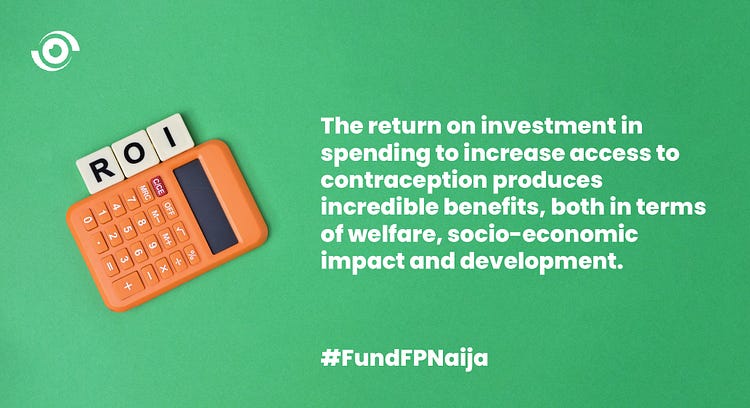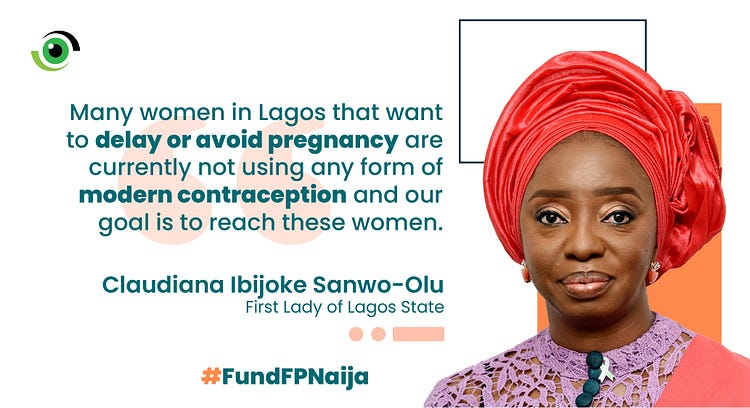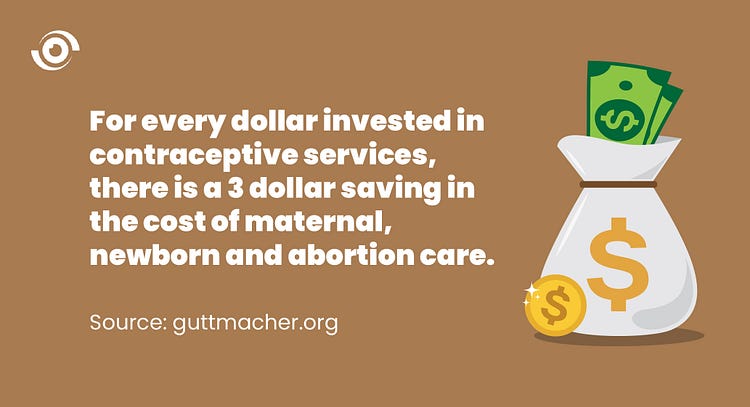Like many countries in sub-Saharan Africa, Nigeria continues to face challenges with meeting the health needs of its population, especially in sexual and reproductive health. Despite cuts in funding from international development partners for Family Planning (FP) services and the revision of the Nigeria Family Planning Blueprint (Scale-Up Plan): 2014–2018 to the currently revised Nigeria Family Planning Blueprint 2020–2024, incorporating issues that emerged since the initial blueprint was developed, there is no line item for FP services and commodities in Nigeria’s 2022 budget. Considering that Nigeria is projected to become the third most populous country in the world by 2050, with an estimated population of over 400 million due to its annual growth rate of 2.6%, this questions the nation’s continued commitment to bridging the huge FP access gaps across the country.
Increasing funding and demand for FP services and commodities is critical as without it, FP services and commodities will not be demanded and made accessible. Recognising the consequences of poor access to FP services, Nigeria Health Watch recently organised a policy dialogue to intensify conversations on the different ways Nigeria can improve its domestic resource mobilisation for FP services. Speakers at the #FundFPNaija dialogue made a business case to increase private sector involvement in funding for FP services, highlighting prospective benefits like tax reduction for participating organisations, reduced maternal mortality, increased revenue generation and funding for health through earmarked taxes and efficient management of resources. The Nigeria Family Planning Blueprint 2020–2024 already highlighted that 80% of modern contraceptives was being provided by the private sector.

Family planning in a new Lagos
Each year, September 8 is set aside as World Contraception Day (WCD), to recognise the rights of couples and individuals to decide freely and responsibly on the number and spacing of their children. In its pursuit for excellence in women’s health and empowerment, the Lagos State Ministry of Health and the Lagos State Government supported by the Post-Pregnancy Family Planning project, the Alumni Association of the National Institute (AANI)-PACFaH@Scale project (PAS) project and other civil society organisations commemorated the 2021 WCD with a policy dialogue themed, ‘Family Planning in a New Lagos: A catalytic Pillar for Female Empowerment and Socio-economic Development’. At the policy dialogue, the First Lady of Lagos State, Her Excellency, Dr. Ibijoke Sanwo-Olu, stated that despite the benefits of FP, it is disheartening to know that for many women, the right to decide when or whether to have children is being hindered by the lack of access to safe and modern method of contraceptives as “many women in Lagos that want to delay or avoid pregnancy are currently not using any form of modern contraception and our goal is to reach these women,” she added.
The business of women’s health
The return on investment in spending to increase access to contraception produces incredible benefits, both in terms of welfare, socio-economic impact and development to the state, which is why in the last 18 months, the Lagos State government has commissioned four modern maternal childcare centres for optimal service delivery.

Professor Adesegun Fatusi, in his presentation, noted that contraceptive prevalence has gradually increased in Lagos but unevenly amongst different groups. With 1.38% annual mCPR for 2014–2020, male condoms and implants remain the most consistently used modern contraception. Fatusi highlighted that the use of traditional contraceptives is higher than for modern contraceptives as about 68% of users seek contraception from local vendors. “People are using FP, but they are not using the more effective method,” he said. According to Professor Fatusi, the private sector, especially through community pharmacies (CPs) and patent & proprietary medicine vendors (PPMVs) are key points of access for modern contraceptives for over 65% users in Lagos.
This is an important access point that government can target for financial incentives to improve the provision and access to FP services as well. The IntegratE project, a 4-year project co-funded by MSD for Mothers, in partnership with the Bill & Melinda Gates Foundation and implemented by a consortium led by the Society for Family Health (SFH) with the Federal Ministry of Health, piloted a 3-tier accreditation system, led by the Pharmacists Council of Nigeria (PCN) to test a task-shifting model in Lagos and Kaduna State. The aim was to enable a scale-up in access to FP commodities and services, through community pharmacists (CPs) and patent and proprietary medicine vendors (PPMVs), especially in rural settings where the informal private sector was already an important source for FP services.

The Zimbabwe example
As the African continent continues to grapple with issues around family planning, there is an economic benefit if developing countries sustain investments in FP services, that could lead to a substantial decrease in unintended pregnancies. For every dollar invested in contraceptive services, there is a 3 dollar saving in the cost of maternal, newborn and abortion care.
Zimbabwe, Botswana and Kenya, were the first sub-Saharan African countries to experience a fertility transition from 6.7 to 4.0 births per woman between 1984 and 2015. Over the last two decades, the modern contraceptive prevalence rate (mCPR) for Zimbabwe has been estimated at 67 percent across all methods among married women and currently stands out as one of the highest in sub-Saharan Africa. The Zimbabwean FP model is an exceptional African success story that should be adopted by other countries.
Though Lagos State is not a country, it is similar in size to Zimbabwe and can adopt many of the structures present in their FP model. As the state sets to achieve a comprehensive developmental agenda through access to FP, it can incorporate the following three approaches from the Zimbabwean model.
- The Zimbabwean government ensured availability of FP services through a vast range of delivery points. The government maintained and strengthened its programs for delivery of FP services from the tertiary hospital to community-based platforms in both the public and private sectors. Mobile clinics, field health workers, health centres, private doctors, private hospitals/clinics were deployed in a bid to step down access to FP service delivery. They showed that a correct and ethical use of modern contraception has major social and life implications.
- Zimbabwe’s ability to achieve a mCPR which is higher than average for sub-Saharan Africa points to the government’s willingness to create an enabling environment that helped FP programs thrive. Demonstrating political will, the Government of Zimbabwe became a signatory to several international and regional conventions, including the International Conference on Population and Development and the Abuja Declaration, of which Nigeria is also a signatory. Furthermore, the government also revised the marriage act, and in 2016 a law was passed increasing the legal age of marriage from 16 to 18 years for boys and girls.
- Lastly, to help the government and partners have a better grasp of the nation’s FP budgetary needs over a period, the Government of Zimbabwe delineated financial resource requirements. Thus, FP funding gaps were identified, enabling the government and donor partners to strengthen commitments through more focused resource mobilisation for FP programme needs over a 5-year period.

Prioritising family planning services
While the long-term goal of the World Contraception Day policy dialogue was to promote gender equality and empowerment for women through the provision of unhindered access to FP, we must not lose sight of the complexity of FP and ensure that women’s voices are heard and that women and girls are able to choose and negotiate their sexual and reproductive health needs.
For Zimbabwe, achieving success in FP also meant improved health care services contributing to a decline in the infant mortality rate from 960 deaths per 100,000 live births in 2010 to 614 deaths per 100,000 live births in 2014. In Nigeria, the under-five mortality ratio is 132 per 1000 live births, meaning that about one in ten Nigerian children never reach the age of 5. It is crucial that health care services are strengthened to increase healthier outcomes for women and children.
Family Planning should be made an urgent national priority and governments at all levels should put their money where their mouth is by ensuring that FP programs and services are well funded in the 2022 budget and beyond. Effort should be made to ensure full implementation of the Nigeria FP blueprint in health facilities by making sure that there are adequately trained service providers and adequate equipment and infrastructure to support service delivery. In addition, the Ministry of Health should lead the implementation of the National Family Planning Communications Plan (NFPCP) to increase demand for family planning. The unmet need for contraceptives among young unmarried users should be addressed and counselling services should provide non-judgmental care.
Given the success of public-private partnerships for COVID-19, there is a clear role for the private sector to play in supporting the government. Public-partnership opportunities should be optimized, leveraging the capacity of the private sector to advance FP services in the delivery of quality healthcare.


